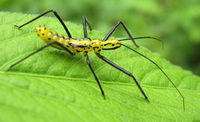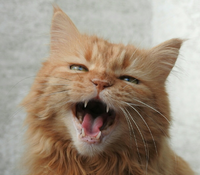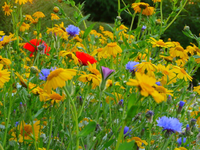Difference between revisions of "Observe"
(→Used in a Sentence) |
(→Used in a Sentence) |
||
| (32 intermediate revisions by the same user not shown) | |||
| Line 2: | Line 2: | ||
===Meaning=== | ===Meaning=== | ||
To '''observe''' is to watch and listen to something very carefully. | To '''observe''' is to watch and listen to something very carefully. | ||
| − | + | : [[Verb]]: '''Observe''' | |
| + | : Singular [[Noun]]: '''Observation''' | ||
| + | : Plural [[Noun]]: '''Observations''' | ||
===Examples=== | ===Examples=== | ||
| − | + | {| class="wikitable" | |
| − | + | |- | |
| − | + | |[[File:Insect.png|Center|200px]] | |
| − | + | |[[File:CatMeow.png|Center|200px]] | |
| − | + | |[[File:Flowers.png|Center|200px]] | |
| − | + | |- | |
| − | + | |A [[scientist]] '''observes''' the number of legs on an [[insect]]. | |
| − | + | |A [[scientist]] '''observed''' that a cat makes a "meow" [[sound]]. | |
| + | |A [[scientist]] made '''observations''' of the colour of different [[Flower|flowers]]. | ||
| + | |} | ||
==Key Stage 2== | ==Key Stage 2== | ||
===Meaning=== | ===Meaning=== | ||
| − | To '''observe''' is to use our [[Sense|senses]] to study something very carefully or use a tool | + | To '''observe''' is to use our [[Sense|senses]] to study something very carefully or use a tool to [[measure]] something. |
| − | : ''' | + | : '''[[Verb]]''': To observe |
| − | : ''' | + | : '''[[Noun]]''': Observation |
| − | : ''' | + | |
| + | ===About Observing=== | ||
| + | : We might [[Sight|watch]] and [[Hearing|listen]] and if it is safe then we might [[smell]] or even [[touch]] something to '''observe''' it. | ||
| + | : We might also use a [[ruler]] to [[measure]] the [[length]] of something or a [[stopwatch]] to [[measure]] how long it takes for something to happen. | ||
===Examples=== | ===Examples=== | ||
| − | : A [[scientist]] uses a [[ | + | : A [[scientist]] uses a [[stopwatch]] to see how long it takes for a kettle to [[Boiling|boil]]. |
: A [[scientist]] took one picture of a [[plant]] every day to see how it [[Growth|grows]]. | : A [[scientist]] took one picture of a [[plant]] every day to see how it [[Growth|grows]]. | ||
| − | : A [[scientist]] [[Touch|touched]] a | + | : A [[scientist]] [[Touch|touched]] a window, a [[brick]] and some carpet to find out which one had the roughest [[texture]]. |
===Used in a Sentence=== | ===Used in a Sentence=== | ||
| − | : A [[scientist]] to observes how long it takes a | + | : A [[scientist]] to '''observes''' how long it takes a kettle to [[Boiling|boil]] one cup of [[water]]. |
| − | : A [[scientist]] observed the [[growth]] of a [[plant]] by taking a picture every day. | + | : A [[scientist]] '''observed''' the [[growth]] of a [[plant]] by taking a picture every day. |
| − | : A [[scientist]] wrote down observations of the [[texture]] of different | + | : A [[scientist]] wrote down '''observations''' of the [[texture]] of different surfaces. |
==Key Stage 3== | ==Key Stage 3== | ||
===Meaning=== | ===Meaning=== | ||
To '''observe''' is to collect information during an [[experiment]] using our [[Sense|senses]] and [[Measure|measuring tools]] and record that information. | To '''observe''' is to collect information during an [[experiment]] using our [[Sense|senses]] and [[Measure|measuring tools]] and record that information. | ||
| + | |||
| + | ===About Observations=== | ||
| + | : '''Observations''' may be informal (not part of an [[experiment]]) and can be used to make a [[hypothesis]] which then leads to an [[experiment]]. | ||
| + | : Some '''observations''' are made during an [[experiment]] because the [[Dependent Variable|dependent variable]] cannot be [[measure]]d. This might happen if there is a colour change of an [[Indicator (Chemistry)|indicator]] or a [[precipitate]] is formed. In both cases these are not [[measure]]d but [[observe]]d. | ||
==Key Stage 4== | ==Key Stage 4== | ||
===Meaning=== | ===Meaning=== | ||
| − | To '''observe''' is to collect and record information during an [[Experiment|experiment]] using | + | To '''observe''' is to collect and record information during an [[Experiment|experiment]] using scientific tools and [[Measuring Instrument|instruments]]. Any [[data]] collected during an [[experiment]] is called an '[[Observation|observation]]'. |
| + | |||
| + | ===About Observations=== | ||
| + | : '''Observations''' may be informal (not part of an [[experiment]]) and can be used to make a [[hypothesis]] which then leads to an [[experiment]]. | ||
| + | : Some '''observations''' are made during an [[experiment]] because the [[Dependent Variable|dependent variable]] cannot be [[measure]]d. This might happen if there is a colour change of an [[Indicator (Chemistry)|indicator]] or a [[precipitate]] is formed. In both cases these are not [[measure]]d but [[observe]]d. | ||
==Key Stage 5== | ==Key Stage 5== | ||
| − | To '''observe''' is to collect and record information during an [[Experiment|experiment]] using | + | ===Meaning=== |
| + | To '''observe''' is to collect and record information during an [[Experiment|experiment]] using scientific tools and [[Measuring Instrument|instruments]] ideally in a way that does not affect the [[experiment]]. In some [[Experiment|experiments]] observing is not a passive activity and the act of observing changes the [[results]] of the [[experiment]]. | ||
Latest revision as of 13:54, 5 April 2019
Contents
Key Stage 1
Meaning
To observe is to watch and listen to something very carefully.
Examples

|

|

|
| A scientist observes the number of legs on an insect. | A scientist observed that a cat makes a "meow" sound. | A scientist made observations of the colour of different flowers. |
Key Stage 2
Meaning
To observe is to use our senses to study something very carefully or use a tool to measure something.
About Observing
- We might watch and listen and if it is safe then we might smell or even touch something to observe it.
- We might also use a ruler to measure the length of something or a stopwatch to measure how long it takes for something to happen.
Examples
- A scientist uses a stopwatch to see how long it takes for a kettle to boil.
- A scientist took one picture of a plant every day to see how it grows.
- A scientist touched a window, a brick and some carpet to find out which one had the roughest texture.
Used in a Sentence
- A scientist to observes how long it takes a kettle to boil one cup of water.
- A scientist observed the growth of a plant by taking a picture every day.
- A scientist wrote down observations of the texture of different surfaces.
Key Stage 3
Meaning
To observe is to collect information during an experiment using our senses and measuring tools and record that information.
About Observations
- Observations may be informal (not part of an experiment) and can be used to make a hypothesis which then leads to an experiment.
- Some observations are made during an experiment because the dependent variable cannot be measured. This might happen if there is a colour change of an indicator or a precipitate is formed. In both cases these are not measured but observed.
Key Stage 4
Meaning
To observe is to collect and record information during an experiment using scientific tools and instruments. Any data collected during an experiment is called an 'observation'.
About Observations
- Observations may be informal (not part of an experiment) and can be used to make a hypothesis which then leads to an experiment.
- Some observations are made during an experiment because the dependent variable cannot be measured. This might happen if there is a colour change of an indicator or a precipitate is formed. In both cases these are not measured but observed.
Key Stage 5
Meaning
To observe is to collect and record information during an experiment using scientific tools and instruments ideally in a way that does not affect the experiment. In some experiments observing is not a passive activity and the act of observing changes the results of the experiment.